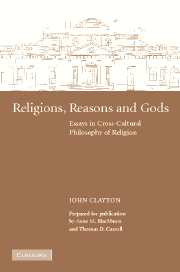Book contents
- Frontmatter
- Contents
- Editorial preface
- Acknowledgments
- List of abbreviations
- 1 Claims, contexts and contestability
- PART I REASON AND RELIGIOUS PLURALISM
- PART II THEISTIC ARGUMENTS IN PRE-MODERN CONTEXTS
- 5 Ramanuja, Hume and ‘comparative philosophy’: remarks on the Sribhasya and the Dialogues concerning Natural Religion
- 6 Piety and the proofs
- 7 The otherness of Anselm
- PART III THEISTIC ARGUMENTS IN EARLY-MODERN CONTEXTS
- Appendix: The 1997 Hulsean Sermon
- Bibliography
- Index
7 - The otherness of Anselm
Published online by Cambridge University Press: 22 September 2009
- Frontmatter
- Contents
- Editorial preface
- Acknowledgments
- List of abbreviations
- 1 Claims, contexts and contestability
- PART I REASON AND RELIGIOUS PLURALISM
- PART II THEISTIC ARGUMENTS IN PRE-MODERN CONTEXTS
- 5 Ramanuja, Hume and ‘comparative philosophy’: remarks on the Sribhasya and the Dialogues concerning Natural Religion
- 6 Piety and the proofs
- 7 The otherness of Anselm
- PART III THEISTIC ARGUMENTS IN EARLY-MODERN CONTEXTS
- Appendix: The 1997 Hulsean Sermon
- Bibliography
- Index
Summary
Anselm's Proslogion is an obvious resource for anyone wishing to reflect on ‘the otherness of God’. The mediaeval monk's desire to be allowed to know and love and rejoice in the being of his God (§26) was in no way fed by a desire to deny God's otherness. His strategy was rather to confirm what we already believe about God's utter difference by making the divine ‘otherness’ intelligible to the human mind; that is, by making otherness thinkable.
God's way of being is one kind; ours, quite another. For instance, I know that my existence is contingent. I can easily think of myself as not existing. I can imagine a time in the past before I came into being, and I can also imagine a time in the future after I shall cease to be. If I put my mind to it, I can even imagine my never having existed at all.
But that is not the way God is, according to Anselm. Unlike ourselves, God can only be conceived as being without beginning and without end, as being ‘inoriginate’ and ‘imperishable’; that is, as being necessary in one mediaeval sense of that term. In chapter 22 of the Proslogion, Anselm hymns his God:
You are that being who exists truly and simply, because you neither were nor will be but always already are, nor can you be thought not to be at any time. And you are life and light, wisdom and blessedness, eternity and many other such good things, indeed you yourself are nothing other than the one and highest good, entirely sufficient to yourself, needing nothing, but he whom all things need for their being and well-being.
- Type
- Chapter
- Information
- Religions, Reasons and GodsEssays in Cross-cultural Philosophy of Religion, pp. 161 - 180Publisher: Cambridge University PressPrint publication year: 2006



